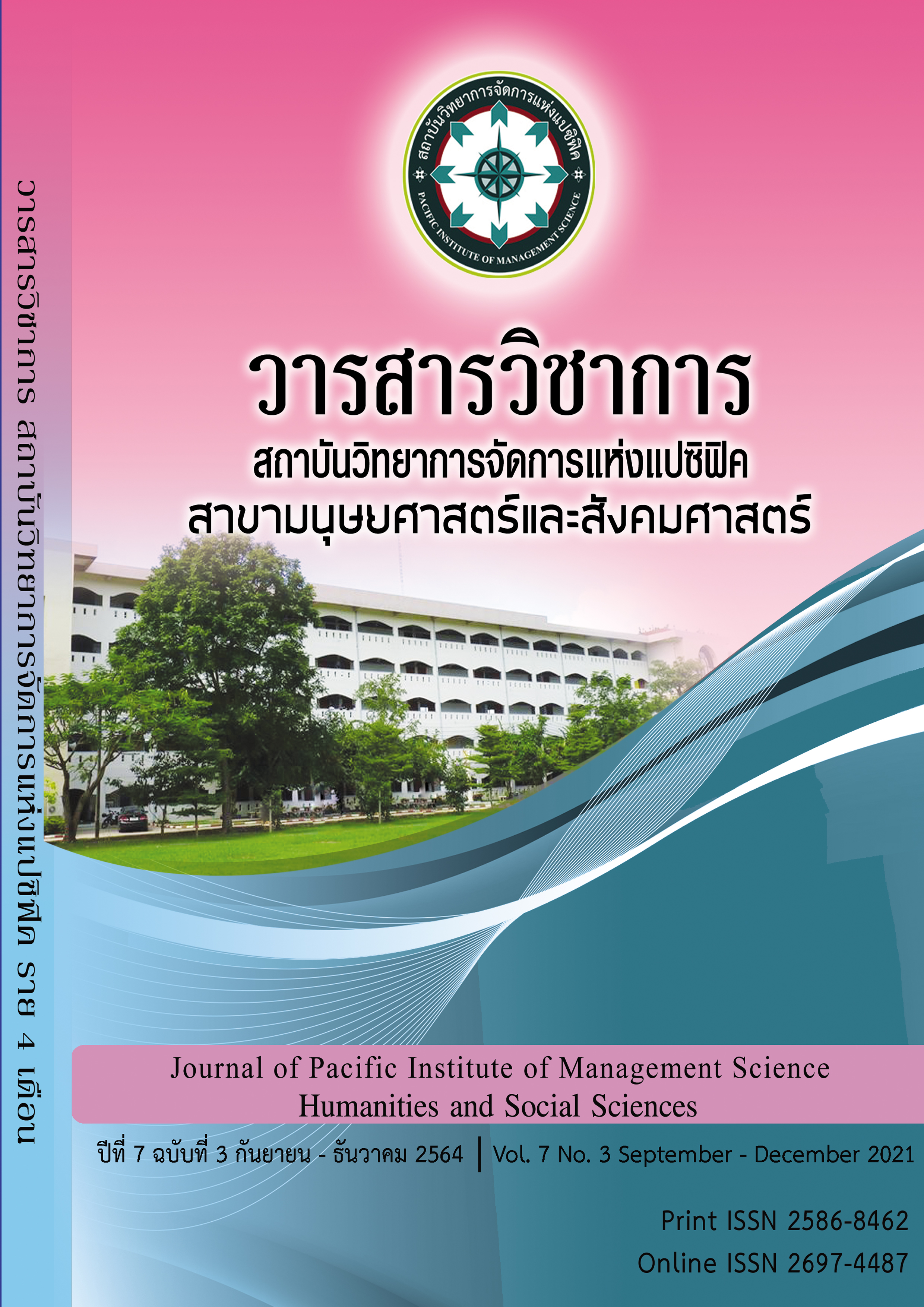Causal Model of External Knowledge Search and Entrepreneurial Orientation on Small and Medium Enterprise Performance in the 3 Southern Border Provinces
Keywords:
External Knowledge Search, Entrepreneurial Orientation, Small and Medium Enterprise PerformanceAbstract
The objectives of this study were to (1) study the level of external knowledge search, absorptive capacity, entrepreneurship orientation, competitive strategy, small and medium enterprise performance in the 3 southern provinces. (2) Study the direct and indirect causal influence of variables. (3) Check the consistency of the causal influence model of variables. (4) Confirm and verify with qualitative data of the causal influence of model of external knowledge search, absorptive capacity, entrepreneurship orientation, competitive strategy, small and medium enterprise performance in the 3 southern provinces.
The research methodology used a combination of quantitative and qualitative research. The population of this research was small and medium sized businesses in the 3 southern border provinces by using data from the Ministry of Industry. The researcher selected only the companies registered as companies and limited partnership, which will get a total of 331 entrepreneurs, with 2 respondents per company equal to 662 people. The respondents are business owners, executives, or people who have knowledge and understanding about the issues in this research. After sending the questionnaires, the researchers received 476 sets of questionnaires. The researcher used the structural equation model and analyzed with Statistical Software Package and LISREL program.
The results of the research showed that the level of variables are as following: the external knowledge search was at high level. The adsorptive capacity was at high level. The entrepreneurial orientation was at high level. The competitive strategy was at medium level and the entrepreneurial performance was at medium level.
The hypothesis testing to examine the direct and indirect influences of the important factors that have an influence on the entrepreneurial performance are as follows: (1) The external knowledge search (EK) did not influence the entrepreneurial performance. (2) The external knowledge search influences the entrepreneurial performance pass the absorptive capacity which is a significant variable in the middle (mediator) at the level of 0.01 (3) Absorption capacity influences the entrepreneurial performance significantly at the level of 0.01 (4) The external knowledge search has a significant influence on entrepreneurial orientation at the level of 0.01 (5) entrepreneurial orientation did not influence the entrepreneurial performance (6) entrepreneurial orientation influence the entrepreneurial performance through the competitive strategy, which is a significant variable (mediator) at the level of 0.01 (7) The competitive strategy has influence on entrepreneurial performance significantly at the level of 0.01.
References
กลุ่มงานบริหารยุทธศาสตร์กลุ่มจังหวัดภาคใต้ชายแดน. (2561). ศักยภาพทางเศรษฐกิจของพื้นที่ 3 จังหวัดชายแดนภาคใต้. ค้นเมื่อ 1 กุมภาพันธ์ 2562, จาก http://www.osmsouth-border.go.th/frontpage
ธีรวิทย์ เฑียรฆโรจน์. (2557). การวิเคราะห์การดาเนินธุรกิจด้านฮาลาลใน 3 จังหวัด ชายแดนภาคใต้. วิทยานิพนธ์มหาบัณฑิต, มหาวิทยาลัยเชียงใหม่, บัณฑิตวิทยาลัย, สาขาเศรษฐศาสตร์.
สุไลมาน ขาเร็มดาเบะ และคณะ (2561). โครงการการศึกษาแนวทางการพัฒนาตลาดเสื้อโต๊ปเพื่อส่งออกไปยังประเทศมาเลเซีย กรณีศึกษาตลาดมัรกัสยะลา. สำนักงานกองทุนสนับสนุนการวิจัย (สกว.)
อกัณห์มณี ลีนาชัย และณักษ์ กุลิสร์. (เมษายน-กันยายน 2556). ปัจจัยและผลกระทบของเหตุการณ์ความไม่สงบใน 3 จังหวัดชายแดนภาคใต้ที่มีต่อธุรกิจโรงแรมขนาดเล็กในอำเภอเมือง จังหวัดยะลา. วารสารบริหารธุรกิจศรีนครินทรวิโรฒ, ปีที่ 4 ฉบับที่ 2. หน้า 18-40.
Chen, J., Chen, Y., & Vanhaverbeke, W. (2011). The influence of scope, depth, and orientation of external technology sources on the innovative performance of Chinese firms. Technovation, 31, 362-373.
Edmond, V., & Wiklund, J. (2010). The historic roots of entrepreneurial orientation research. Hist. found. Entrepres, 142–160.
Eggers, F., Hansen, D. J., & Davis, A. E. (2011). Examining the relationship between Customer and entrepreneurial orientation on nascent firms' marketing strategy. The International Entrepreneurship and Management Journal, 8, 203–222.
Ferreras-Mendez, J. L., Fernandez-Mesa, A., & Alegre, J. (2016). The relationship between knowledge search strategies and absorptive capacity: A deeper look. Technovation, 54, 48-61.
Ferreras-Mendez, J. L., Newell, S., Fernandez-Mesa, A., & Alegre, J. (2015). Depth and breadth of external knowledge search and performance: The mediating role of absorptive capacity. Industrial Marketing Management, 47, 86-97.
GEM Thailand Report, (2018). The Global Entrepreneurship Monitor. Retrieved 8 December 2018.
Laursen, K., & Salter, A. (2006). Open for innovation: The role of openness in explaining innovation performance among UK manufacturing firms. Strategic Management Journal, 27(2), 131-150.
Linton, G., & Kask, J. (2017). Configurations of entrepreneurial orientation and competitive Strategy for high performance. Journal of Business Research, 70, 168–176.
Monteiro, F., Mol, M., & Birkinshaw, J. (2017). Ready to be Open? Explaining the Firm Level Barriers to Benefiting from Openness to External Knowledge. Long Range Planning, 50, 282-295.
Patterson, W., & Ambrosini, V. (2015). Configuring absorptive capacity as a key process for research intensive firms. Technovation, 36-37, 77–89.
Porter, M. E. (1980). Competitive strategy: Techniques for analyzing industries and competition. New York, NY: Free Press.
Trott, P., & Hartmann, D. (2009). Why ‘open innovation’ is old wine in new bottles. International Journal of Innovation Management, 13(4), 715-736.
Wales, W. J., Gupta, V. K., & Mousa, F. T. (2013). Empirical research on Entrepreneurial orientation: An assessment and suggestions for future research. International Small Business Journal, 31, 357–383.
Zahra, S. A., & Garvis, D. M. (2000). International corporate entrepreneurship and firm performance: The moderating effect of international environmental hostility.Journal of Business Venturing, 15(5), 469–492.
Zahra, S. A., & George, G. (2002). Absorptive capacity: A review, reconceptualization, and extension. Academy of Management Review, 27(2), 185–203.
Downloads
Published
Issue
Section
License
Copyright (c) 2022 Pacific Institute of Management Science

This work is licensed under a Creative Commons Attribution-NonCommercial-NoDerivatives 4.0 International License.
บทความที่ได้รับการตีพิมพ์เป็นลิขสิทธิ์ของ สถาบันวิทยาการจัดการแห่งแปซิฟิค
ข้อความที่ปรากฏในบทความแต่ละเรื่องในวารสารวิชาการเล่มนี้เป็นความคิดเห็นส่วนตัวของผู้เขียนแต่ละท่านไม่เกี่ยวข้องกับสถาบันวิทยาการจัดการแห่งแปซิฟิค และคณาจารย์ท่านอื่นๆในสถาบันฯ แต่อย่างใด ความรับผิดชอบองค์ประกอบทั้งหมดของบทความแต่ละเรื่องเป็นของผู้เขียนแต่ละท่าน หากมีความผิดพลาดใดๆ ผู้เขียนแต่ละท่านจะรับผิดชอบบทความของตนเองแต่ผู้เดียว







